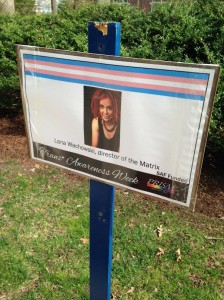“I grew up without an understanding of what gender meant and how it influenced my life,” Avory Faucette said of hir (a gender neutral pronoun) upbringing in conservative, religious North Carolina.
Faucette, a trans-queer feminist activist and writer, spoke in the Library Auditorium Thursday, April 27, as part of the College’s Trans Awareness Week.

“Try not to put someone down because they view life from a different perspective,” zie (a gender-neutral pronoun substitute for “she”) said. “Being openly trans entails a breaking of the gender binary, and many people tend to be unaccepting of such a lifestyle.”
Faucette spoke of the everyday choices about how much to reveal regarding hir sexual identity.
“The complexities of identity are often difficult to explain because sometimes it’s tiring to do so, and there’s always the possibility of potential backlash against you.”
According to the National Trans Discrimination Survey, 51 percent of trans people have been harassed or bullied due to their differences. One in six students has left college due to assault, and 41 percent have attempted suicide, compared to just 16 percent of the general public.
“Social understanding needs to follow legal changes,” zie said.
Faucette earned a J.D. from the University of Iowa, and much of hir talk focused on the intersection of gender, media and law.
Zie mentioned several societal situations in need of reform to accommodate the needs of transgender people.
“Gender discrimination is prominent and unfortunately tough to prove concerning trans people in the workplace,” zie said.
Other pertinent issues pertain to prison reform, medical care and verified gender changes on ID.
“Making others aware of these issues is the first step to getting them to care and ending the discrimination,” zie said.
Students saw the presentation as a valuable experience and education on important national and on-campus issues.
“Faucette opened my eyes to inequalities that, before this talk, were practically invisible to me,” senior civil engineering major Brian Kunz said.
The most important step students can take is to contribute to the conversation and further educate students that may have missed the presentation.
“This talk helped me gain perspective on an overlooked problem in society,” senior marketing major Tom Infosino said.






